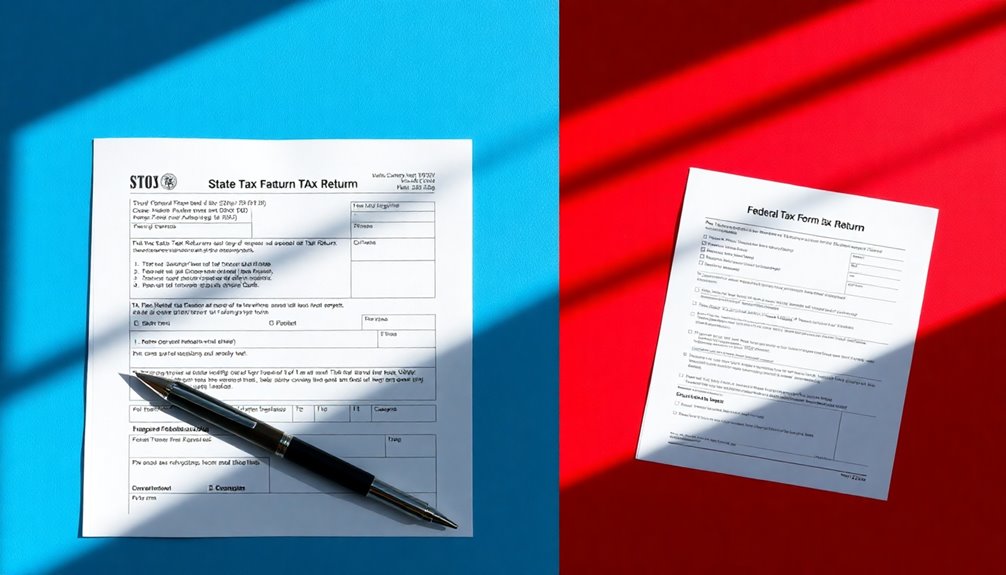Yes, state and federal taxes come separately. You'll file your federal taxes with the IRS and state taxes with your state's tax authority. Each has unique rules, deductions, and credits that can affect your overall tax burden. If you work in multiple states or move, you may need to file in more than one state. Remember, your taxable income can also differ between federal and state returns. When you understand these differences, you can make smarter financial decisions. Keep going to discover more about tax benefits and filing strategies that can work best for you.
Key Takeaways
- State and federal taxes are filed separately and sent to different tax authorities: federal returns to the IRS and state returns to respective state tax agencies.
- Each state has its own rules, income thresholds, and tax structures, independent of federal tax regulations.
- Taxable income may be defined differently at the federal and state levels, influencing overall tax calculations.
- Deductions and credits can vary significantly between state and federal tax filings, affecting the final tax liability.
- Individuals may need to file multiple state tax returns if they work or reside in different states during the tax year.
Understanding Tax Jurisdictions

When it comes to understanding tax jurisdictions, it's essential to recognize the layers of tax collection that exist at the federal, state, and local levels. At the federal level, the Internal Revenue Service (IRS) collects income taxes, while individual state governments handle state income taxes. Some states opt for a no-income-tax approach, relying instead on other forms of taxation. Additionally, local municipalities may impose their own taxes, such as payroll or additional income taxes.
Taxable income definitions can vary. Generally, federal taxable income is your gross income minus deductions and exemptions. Many states start with your federal adjusted gross income (AGI) for their income tax calculations, although some use federal taxable income. A few states have unique definitions, often based on federal rules. In 2021, 41 states and D.C. imposed broad-based individual income tax, highlighting the significant reliance on this revenue source.
States often conform to federal tax laws, which simplifies the process, but this can change based on tax law updates. Some states may decouple from federal rules following significant changes, like the Tax Cuts and Jobs Act.
Moreover, state tax systems can differ widely, with some using progressive rates, flat rates, or even no income tax at all.
Filing State vs. Federal Taxes

Understanding tax jurisdictions sets the stage for knowing how to file your state and federal taxes. When it comes to filing, you'll need to consider both federal and state requirements. If you live or earn income in a state that imposes an income tax, you'll likely need to file state taxes, often triggered by the same criteria that apply to federal taxes.
Remember, each state has its own rules and income thresholds, so check what applies to you. Additionally, it's important to be aware of the potential tax implications related to a Gold IRA, which can affect your overall financial planning. You might even have to file in multiple states if you work in one and live in another, or if you move during the tax year. Furthermore, states with different tax systems can create varying obligations that may impact your filing process. Understanding your tax obligations can help ensure compliance and avoid penalties.
Federal income tax returns go to the IRS, while state returns go to your state's tax authority. You'll use specific forms for each, like IRS Form 1040 for federal taxes, and your state may require additional forms.
Both federal and state tax returns allow for deductions and credits, though they can differ. Lastly, don't forget that state taxes can sometimes be deducted on your federal return, which might benefit your overall tax situation.
Impact of Filing Status

Your filing status significantly impacts your tax obligations and potential refunds. Each category—Single, Married Filing Jointly, Married Filing Separately, Head of Household, and Qualifying Surviving Spouse—comes with unique tax rates and benefits.
For instance, if you're Single, you might face higher tax rates compared to those who file jointly. Choosing Married Filing Jointly usually allows you to enjoy lower tax rates and a higher combined standard deduction. Additionally, higher standard deductions are available for those who file jointly, which can further reduce overall tax liability.
On the other hand, if you opt for Married Filing Separately, you may find yourself in a higher tax bracket, which could limit your deductions. If you qualify as Head of Household, you can benefit from more favorable tax brackets than a Single filer, but it still won't match the advantages of filing jointly.
Lastly, if you're a Qualifying Surviving Spouse, you can use joint return rates, which can significantly reduce your tax liability for the couple of years following your spouse's death.
Understanding how your filing status affects your taxes is crucial for effective tax planning. Choose wisely to maximize your potential refunds and minimize your tax obligations.
Tax Benefits and Deductions

Choosing the right filing status can set the stage for maximizing your tax benefits and deductions. You can opt for the standard deduction, which for 2024 is $14,600 if you're single or $29,200 if you're married filing jointly.
Alternatively, you might consider itemized deductions, allowing you to deduct specific expenses like mortgage interest, state and local taxes, and charitable contributions. Keep in mind that itemized deductions require proper documentation, so save those receipts.
There are common deductions that could benefit you, such as student loan interest, medical expenses exceeding 7.5% of your adjusted gross income, and even gambling losses. Additionally, understanding how tax deductions can reduce your taxable income is crucial for effectively managing your tax liability.
For businesses, deductions can include net operating losses and various business expenses.
Remember, tax deductions reduce your taxable income, which in turn lowers your tax liability. While they're valuable, tax credits provide a more direct benefit by reducing your tax bill dollar for dollar.
Ultimately, understanding these deductions and credits can help you make informed decisions, ensuring you take full advantage of the opportunities available to you when filing your taxes.
Joint and Separate Liability

How do joint and separate liabilities impact your tax situation? When you're married, you can choose to file your federal taxes jointly or separately.
Filing jointly means both you and your spouse are jointly and severally liable for the total tax bill, including any interest and penalties. This means the IRS can pursue either of you for the entire amount owed, regardless of who earned the income.
When you file jointly, the IRS calculates your tax based on your combined income, which often results in a lower tax liability compared to filing separately. However, if you opt for separate filing, you each report your individual income, and this could limit your access to certain credits and deductions.
It's crucial to understand that if there are errors or omissions on a joint return, both of you're liable. However, if you find yourself facing tax issues due to your spouse's actions, you might qualify for innocent spouse relief under specific conditions, which is designed to protect individuals from unfair tax burdens due to a spouse's actions.
Ultimately, weighing the pros and cons of each filing status is essential, and consulting a tax professional can help you make the best choice for your financial situation.
Frequently Asked Questions
How Do State Tax Rates Compare to Federal Tax Rates?
When you compare state tax rates to federal tax rates, you'll notice a few key differences.
Generally, state rates are lower and can be flat or progressive, depending on where you live. Federal tax rates, on the other hand, are progressive, ranging from 10% to 37%.
Each state has its own tax system, impacting how much you pay overall. Understanding these differences helps you navigate your tax obligations more effectively.
Can I E-File State and Federal Taxes Together?
Yes, you can e-file state and federal taxes together.
When you use commercial tax software, it often allows you to complete both returns in one session. Just make sure your federal return is accepted first, as state returns can't be e-filed until then.
E-filing them simultaneously not only simplifies the process but also adds an extra layer of security for your sensitive information. It's a convenient option for many taxpayers.
Are State Tax Refunds Taxable at the Federal Level?
Yes, state tax refunds can be taxable at the federal level, but it depends on your previous deductions.
If you itemized and deducted state taxes last year, your refund may be taxable. You'll need to calculate how much of the refund exceeds what you'd have deducted using the standard deduction.
If you didn't itemize, you won't report the refund as income.
Always check the specifics to avoid surprises when filing your federal return.
What Happens if I Owe State and Federal Taxes Simultaneously?
If you owe state and federal taxes simultaneously, you'll need to handle each debt separately.
The IRS manages federal tax collections, while your state's tax authority deals with state taxes. This means you could face different collection actions, penalties, and notices from each.
It's crucial to stay on top of both obligations to avoid additional fees and complications, as failing to pay either can lead to serious consequences.
Can I Claim the Same Deductions on Both State and Federal Taxes?
You can claim some of the same deductions on both your state and federal taxes, but it varies by state.
For instance, while federal itemized deductions generally apply, some states have their own specific rules or limits.
If your state aligns with federal standards, like Arizona, you'll see similar deductions.
However, states like Maryland may prorate deductions, so it's crucial to check your state's guidelines for any differences.
Conclusion
In summary, yes, state and federal taxes come separately, and understanding this distinction is crucial for your financial planning. You'll need to file both types of taxes, considering your filing status and the various deductions available to you. Whether you choose to file jointly or separately can impact your overall liability, so weigh your options carefully. Staying informed about your obligations helps ensure you make the most of your tax situation and avoid any surprises come tax season.









